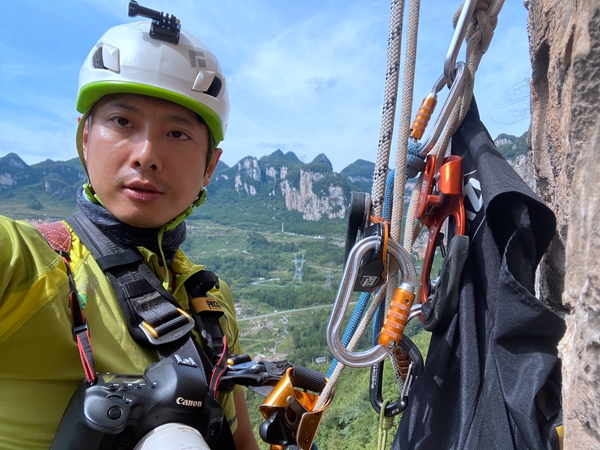 |
|
He climbs a cliff in Zhongshan district, Liupanshui, in August 2020.[Photo provided to China Daily] |
New findings
In February 2019, Zhou and a few of his spelunking friends went through the snorkeling plan for Miaoting cave and were the first to explore its underground stream.
They managed to bring back valuable images of a tunnel that runs 26 meters below the bed of the waterway, and discovered a new subspecies of cave bug, which has yet to be named.
"People like Zhou have helped offer scientific institutes locations and other clues about caves," says Qian Zhi, vice-president of the Guizhou Cave Association, which is affiliated to the mountain resources research institute of Guizhou Academy of Sciences.
Their cave explorations have helped raise the awareness of people about the need to protect the environment. For example, they remove trash they find during expeditions, such as plastic bags or bottles that may have drifted there from neighboring waterways and stayed in the cave.
Zhou says: "I remove trash from the caves if it's not big, but if there is too much waste, we usually gather it together, and report it to get it removed."
The trash they removed from the underground water areas in those caves and the films they made recording the details of the caves' interiors were of significant importance, Qian explains. The trash removal can help avoid water pollution, while the filming can uncover ancient murals before they are damaged by natural causes or human behavior.
Most of the large caves have been found in southwestern China, such as in Chongqing municipality, Yunnan and Sichuan provinces, Qian says.
To date, more than 6,000 caves have been located across Guizhou, and about 2,000 have been explored, he says.
About 200 caves in the province have been tapped for various purposes, such as for developing tourism.
The Shuanghe cave in Zunyi city's Wenquan town and Zhijin cave in Zhijin county, in Guizhou, have both evolved into tourism hot spots, creating job opportunities and a marked increase in local income, Qian says.
The consistent temperature has also made the caves ideal places for growing things like mushrooms or storing food and other supplies. "Of course, all those things need to be done under long-term supervision and analysis," Qian says.
Scientists can study meteorology, archaeology and hydrology through exploration of these caves.
"It's good that we've found an increasing number of young people like Zhou who have taken an interest in outdoor expeditions," Qian says. "They can play a positive role in urging the public to preserve the caves."
Earlier this year, Zhou became a full-time professional dive coach.
"I want to share my experiences and help more people to see the charm of outdoor adventures," Zhou says.
"The ability to overcome difficulty that is developed in the outdoors can be used to deal with setbacks in other areas of life."
In March, he registered an account on the short-video platform Douyin, known internationally as TikTok, which has so far attracted more than 800,000 followers.
"They seem very interested in the adventure stories and special geological images I display online," Zhou says.